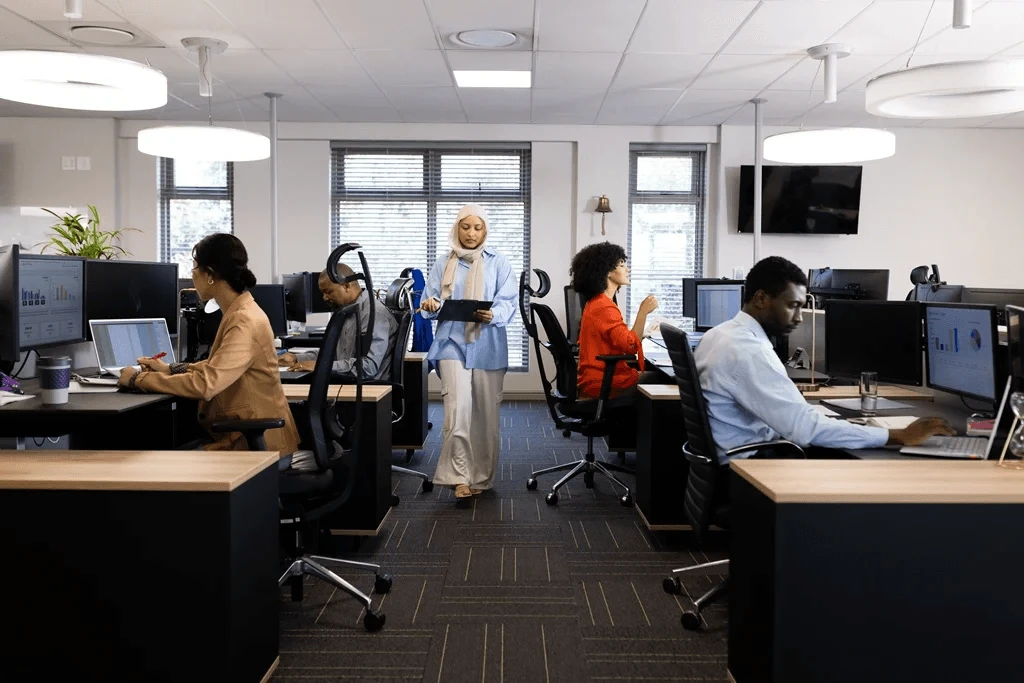Office etiquette is essential for building a positive, productive work environment. Whether you’re a seasoned professional or a job seeker looking to make a strong impression in your next role, your career progression might hinge upon your understanding and adherence to the office dos and don’ts.
In this blog, we’ll explore the fundamentals of office etiquette, why it’s important, and offer actionable tips for young professionals looking for advice to thrive in their work environment.
What is Office Etiquette?
Office etiquette refers to a set of accepted behaviors and manners that promote respect, professionalism, and positive interactions within the workplace. These behaviors help create an environment where all employees feel comfortable and valued, which in turn leads to increased productivity and satisfaction. Basic office etiquette may include actions like greeting colleagues with a friendly smile, offering help when necessary, and using respectful language during conversations.
Examples of office etiquette also extend to respecting personal life and maintaining professional boundaries. For instance, while it’s important to engage with coworkers and build relationships, it’s equally important to understand when to give others their space, whether that means avoiding loud phone calls or not interrupting colleagues when they are in deep focus. Avoiding excessive personal calls during office hours also ensures a more productive and respectful environment.

The Importance of Office Etiquette in the Workplace
The importance of office etiquette cannot be overstated, as it has a direct influence on the effectiveness of communication and collaboration within teams. When employees adhere to office etiquette, they contribute to an open and supportive work environment where ideas are shared freely. This type of culture fosters creativity and enhances teamwork, allowing individuals to work together toward common goals without unnecessary friction.
Furthermore, good office etiquette helps resolve conflicts efficiently and gracefully. By maintaining professionalism, even in tense situations, employees can address disagreements calmly and respectfully, focusing on finding solutions instead of escalating tensions. Office etiquette also builds trust and respect between colleagues and supervisors, which is crucial for long-term success. Good manners play a key role in establishing a harmonious workplace where everyone feels valued.
Key Office Etiquette Rules Every Employee Should Follow
Office etiquette touches various aspects of workplace behavior. Below, we categorize essential etiquette rules into key areas to help you navigate your office environment with professionalism.
Communication Etiquette
- Answering the Phone Professionally – When answering the phone, use a polite greeting, and speak clearly. Avoid informal language or distractions.
- Work Emails – Be concise, professional, and mindful of your tone when sending emails. Always double-check for spelling errors before hitting send.
- Respond to Emails in a Timely Manner – Acknowledging and responding to work emails quickly shows professionalism and respect for your colleagues’ time.
- Maintain a Professional Tone – Whether in person or through email, always use a courteous and respectful tone when interacting with colleagues.
- Use Appropriate Language – Avoid slang, overly casual expressions, or offensive language. Always aim for clarity and professionalism in your communication.
- Limit Personal Conversations – Save personal topics for breaks or after work. Keep office conversations focused on work-related matters.
- Stay Present During Conversations – Whether on the phone or in person, avoid multitasking during conversations. Give your full attention to the person speaking.
Punctuality and Time Management
- Arrive on Time – Being punctual shows respect for your colleagues’ time and helps maintain a structured workday.
- Complete Tasks in a Timely Manner – Meeting deadlines demonstrates reliability and allows the team to stay on track with projects.
- Respect Meeting Times – Be prompt and prepared for meetings to avoid wasting others’ time. Notify colleagues ahead of time if you’ll be late.
- Be Consistent – Maintain a routine that allows you to consistently arrive on time and meet deadlines.
- Avoid Procrastination – Manage your time well and avoid putting off important tasks, as this might cause stress and delays.
- Use Breaks Wisely – Make sure your breaks are timely and respect the needs of the team. Don’t take longer breaks than allotted.
- Be Prepared for Meetings – Always come prepared with any materials or information needed for meetings to avoid delays or disruptions.

Respect for Workspace and Personal Boundaries
- Respect Personal Space – Be mindful of your colleagues’ physical and mental space. Avoid hovering or interrupting when they are focused on their work.
- Keep Your Workspace Tidy – A clean workspace reflects professionalism and helps minimize distractions for everyone.
- Avoid Loud Conversations – Keep your voice low to avoid disturbing others, especially in open-plan offices.
- Ask Before Borrowing – Always ask permission before using or borrowing someone else’s equipment or office supplies.
- Follow Cleanliness Guidelines – If your company has specific guidelines about shared spaces (like the kitchen), be sure to follow them.
- Respect Shared Spaces – Be considerate when using common areas like the kitchen, conference rooms, or lounge areas. Clean up after yourself.
- Respect Privacy – Never invade a colleague’s workspace or read their documents without permission.
Dress Code and Body Language
- Follow the Dress Code – Adhere to the company’s dress code or guidelines. When in doubt, it’s better to lean toward business casual than overly casual, like wearing flip flops.
- Mind Your Posture – Sitting or standing with good posture shows attentiveness and confidence. Slouching can give the wrong impression.
- Maintain Eye Contact – Making eye contact during conversations shows you are engaged and respectful of the speaker.
- Dress Appropriately for the Role – Choose your attire based on the nature of your role and the company culture.
- Keep Accessories Subtle – Avoid distracting or excessive accessories that might detract from a professional image.
- Be Groomed – Ensure that you are well-groomed and clean, reflecting a polished appearance.
- Be Aware of Non-Verbal Cues – Body language speaks volumes. Use gestures that reflect respect and attention.
Additional Dos and Don’ts of Workplace Etiquette
To further guide you in navigating the complexities of workplace interactions, here are some additional dos and don’ts of office etiquette:
Dos:
- Do keep personal conversations to a minimum
- Do maintain a positive attitude
- Do respect the conference room
- Do practice active listening
- Do be polite in emails and phone calls
Don’ts:
- Don’t interrupt others when they are speaking
- Don’t engage in gossip
- Don’t ignore your emails
- Don’t dress too casually
- Don’t bring personal issues to work

Achieve Your Professional Goals with Resume Professional Writers
Mastering office etiquette is an essential skill that greatly impacts your career prospects. By implementing the tips shared in this blog, you will build a stronger professional reputation and contribute to a positive work environment wherever you go. However, to truly stand out in your job search or career transition, your resume must first reflect your professionalism and understanding of workplace etiquette.
When it comes to crafting a resume that positions you as a highly qualified candidate, Resume Professional Writers has the expertise to ensure your skills and experiences are highlighted in the best light possible. Whether you’re navigating a career change or seeking to move up the corporate ladder, having a polished, professional resume can make all the difference in catching the eye of hiring managers. Let us help you take your career to the next level by creating a resume that sets you apart from the competition.








